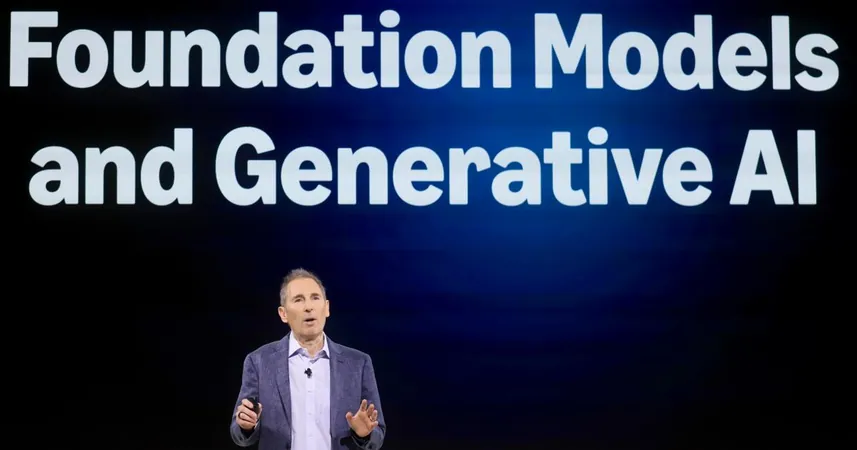
The Rising Tide of AI: Should Workers Be Concerned About Job Losses?
2025-07-05
Author: Ying
Tech Giants Cut Jobs as AI Takes the Spotlight
In a rapidly evolving tech landscape, companies are slashing jobs at an alarming rate while increasingly relying on the capabilities of artificial intelligence (AI). Amazon’s CEO, Andy Jassy, has hinted at a potential workforce reduction as AI enhances operational efficiency. Meanwhile, at Salesforce, Marc Benioff revealed that AI is already responsible for 30% to 50% of the company's functions.
The Job Market Revolution: A Double-Edged Sword
As fears of automation loom large, a report from the Pew Research Center indicates that nearly half of U.S. workers are anxious about the future role of AI in their jobs. With major players like Microsoft and Meta cutting their workforce, the anxiety over job security is palpable, leading many to wonder if AI advancement will create more positions or simply replace existing ones.
A Glimpse into the Future of Work
Robert Lucido from Magnit stated, "AI isn’t just taking jobs; it’s fundamentally rewriting the very definition of work." This sentiment is echoed by experts who argue that while significant displacement may occur, the real transformation lies in the evolving nature of job roles, adapting to AI rather than competing against it.
AI’s Impact: A Divided Opinion
Not all tech executives agree on the extent of AI's disruptive potential. Sam Altman, CEO of OpenAI, acknowledged the anxiety surrounding this shift but believes that the current job market is underemployed and that the demand for skilled roles will still grow, creating new opportunities even amidst uncertainty.
Navigating the AI-Driven Economy
As businesses tighten their belts and become more selective in hiring, the quest for what Lucido calls "purple unicorns"—uniquely skilled candidates—will intensify. AI’s arrival is reshaping roles across the board—from software development to legal sectors, with many anticipating fluctuations in employment rates.
What’s Next for Workers?
The McKinsey Global Institute predicts that by 2030, up to 30% of job functions across the U.S. economy could be automated, particularly in routine tasks that machines can easily handle. Conversely, roles in science, technology, engineering, and math (STEM) are expected to flourish as companies continue to innovate.
The Skills of Tomorrow
While AI poses a threat to certain job categories like paralegals and customer service representatives, other positions—such as those involving creative and technical skills—will likely remain in demand. In fact, workers are evolving; history shows adaptability in the face of technological advancements.
A New Era for Job Seekers
With the tech industry already reporting a shocking 74,716 job cuts in just a few months, workers are understandably anxious. Autodesk, for example, recently trimmed 9% of its workforce to invest in AI technologies, reinforcing that the future will demand not just adaptability but also specialization in AI-related roles.
Adapting to Change: The Human Element
Diana Colella of Autodesk emphasizes the importance of human creativity in the age of AI, expressing confidence that AI will enhance rather than replace jobs. As workers have shown resilience and adaptability before, there lies hope that the necessary skills will enable them to pivot to new roles in this ever-changing job market.



 Brasil (PT)
Brasil (PT)
 Canada (EN)
Canada (EN)
 Chile (ES)
Chile (ES)
 Česko (CS)
Česko (CS)
 대한민국 (KO)
대한민국 (KO)
 España (ES)
España (ES)
 France (FR)
France (FR)
 Hong Kong (EN)
Hong Kong (EN)
 Italia (IT)
Italia (IT)
 日本 (JA)
日本 (JA)
 Magyarország (HU)
Magyarország (HU)
 Norge (NO)
Norge (NO)
 Polska (PL)
Polska (PL)
 Schweiz (DE)
Schweiz (DE)
 Singapore (EN)
Singapore (EN)
 Sverige (SV)
Sverige (SV)
 Suomi (FI)
Suomi (FI)
 Türkiye (TR)
Türkiye (TR)
 الإمارات العربية المتحدة (AR)
الإمارات العربية المتحدة (AR)